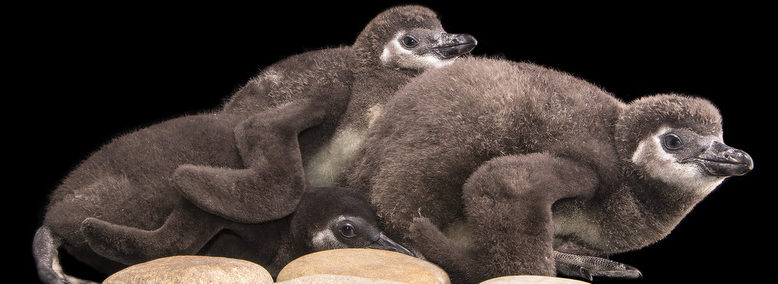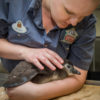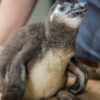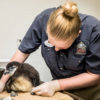The baby boom continues at ZooTampa at Lowry Park with the hatching of three African penguin chicks. The zoo’s “clutch mate” chicks hatched on January 7, 2018 and January 9, 2018 weighing in at 54 grams and 48 grams, to experienced parents Tinkerbell and Loki. “Clutch mates” means that the female penguin laid two eggs a few days apart, both were fertile and hatched. The third chick hatched on January 12, weighing in at 53 grams, to first time parents Tyke and Tyra.
“Both pairs of parents are doing a great job taking care of their chicks,” said Chris Massaro, General Curator at ZooTampa. “The addition of these chicks is a great win for the species and an exciting time for our community to learn more about these beautiful birds.”
The zoo is currently home to a colony of 12 African penguins and participates in the African penguin Species Survival Plan (SSP). The program of the Association of Zoos and Aquariums (AZA) protects wildlife species at risk of extinction. ZooTampa also participates in the AZA SAFE: Saving Animals From Extinction program which focuses on having animal experts identify threats, develop action plans, raise new resources and educate visitors on animal conservation. At the same time, SAFE will build capacity to increase direct conservation spending, as well as our members’ impact on saving species through work in the field, in our zoos and aquariums, and through public engagement. We have done it before. Some species exist only because of the efforts of aquariums and zoos and our partners. The chicks will be the first additions to the zoo’s colony since June 2014.
It is very difficult to tell a penguin chick’s gender. A DNA blood test will be used to determine the gender of the chicks when they are old enough. The zoo uses bands on the adult penguins’ flippers to show the gender – right flippers for males and left flippers for females. ZooTampa plans to reveal the gender of the chicks in the near future.
Native to the coastlines of South Africa and Namibia, the African penguin is one of five true warm weather species. The species is considered endangered in the wild due to food shortages from commercial fishing, oil spills, egg collection and fishing nets. The population declined more than 50 percent during the last 40 years.
For the latest on ZooTampa and other attractions, theme parks and more across the region, be sure to follow Touring Central Florida on twitter @TourCentralFL & @androckb, and give our facebook page a like.




